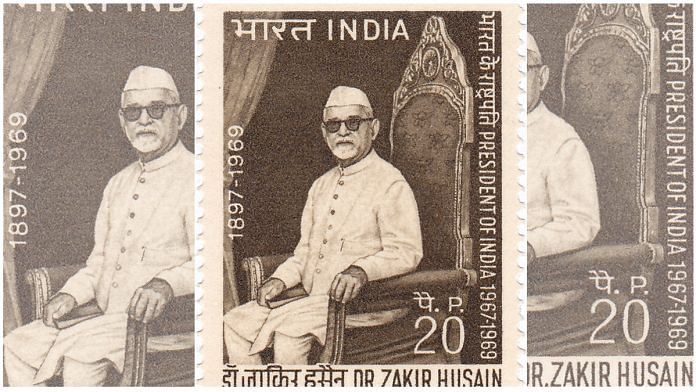New Delhi: Dr Zakir Husain, India’s third President had a deep understanding of politics. His kind of politics was subservient to the importance of education. A book titled Presidents of India, 1950-2003, written by Janak Raj Jai, has documented his comments on the same. “Politics, especially in our country, is like a mountain stream which suddenly overflows and soon recedes, while educational work flows not only during the monsoon, but also in the summer by melting the hearts of mountains. Politics is concerned with the strengthening of national existence, and is impatient by its nature, education is dedicated to social ideals, it is inherently patient which is why education is the master and politics its servant.”
On 8 February 1897, Dr Husain was born into an upper middle class family in Hyderabad. His early education started in a residential school called Sultan Bazar High School. After a comfortable childhood, Husain joined Mohammedan Anglo Oriental College at Aligarh, which later came to be known as Aligarh Muslim University.
Entry into politics
His entry into the political landscape began on 12 October 1920, when, according to Janak Raj Jai’s book, he joined a call for non-cooperation that was issued to students in Aligarh by Mahatma Gandhi. Activist and journalist Maulana Mohammed Ali had been invited to address the students in Aligarh on the importance of the non-cooperation movement, and ask for their support. After Ali finished his speech, Rasheed Ahmed Siddiqui, Zakir Husain’s companion found Husain sitting on the ground with tears running down his cheeks. When asked what had happened, Husain said, “Good bye, Rasheed Saheb; Life has well begun; pray, now, for its proper end. Please give to Yusuf and Mehmood (his younger brothers) all that I have got and send back the college papers, lying with me.” After that, Zakir Husain committed all his time to the non-cooperation movement.
Later, he joined the Jamia Millia Islamia and served as its vice-chancellor from 1926 to 1948. Four years later, he entered the upper house of Parliament. From 1956 to 1958, he was also part of the executive board of the United Nations Educational, Scientific, and Cultural Organization (UNESCO). In 1957, Dr Husain was appointed as the Governor of Bihar and later elected as vice-president in 1962. As an official candidate of the Congress party, he was elected as the President of India in 1967.
One of his first statements upon being elected president was: “I began my public life at the feet of Mahatma Gandhi and he has been my guide and inspirer. I have endeavoured to follow in my life some of Mahatma ji’s teachings, and in this new opportunity of servicing our people that I got I shall do my utmost to take my people towards what Gandhiji strove restlessly to achieve — a pure life individual and social, an insistence on the means being as pure as the end, an active and sustained sympathy for the weak and downtrodden and fervent desire to forge unity among the diverse sections of the Indian people as the first condition for helping to establish peace and human brotherhood in the world based on truth and non-violence.”
Dr Husain held the President’s office from 1967 till his death on 3 May, 1969.
The Jamia connect
Dr Husain had all the qualities of a politician, but he was a true educationist at heart. Janak Raj Jai’s book has documented his beliefs on the importance of education: “Those who think that after coming out of the college and schools their education concludes and they do not have any further education are thoroughly mistaken. The objective of education is not merely some selected books in the colleges and universities. There must be many among you who might not be getting the chance to acquire the education equivalent to yours. Remember, if you are unaware of this part of education, you will perish. If you are successful in your effort that alongside you some of your less privileged brethren are also considerably educated and developed, you will have performed a great feat.”
Dr Zakir Husain earned himself a respectable position in the field of education after he joined Jamia Millia Islamia in 1926. Jamia became a way of life for Dr Husain and it was often said, “Jamia was Zakir and Zakir was Jamia”.
He was appointed as the Shaikh-ul-Jamia (vice-chancellor) of Jamia even when it operated out of a small building in Karol Bagh, Delhi. Later, it shifted into the big campus in Okhla.
Even when Dr Husain met Mahatma Gandhi for the first time at Sabarmati Ashram in 1926, he told him, “Jamia itself is totally committed to train the soldiers for the war of independence”.
“Jamia was born in times when the two major communities, the Hindus and Muslims joined hands in a concerted effort,” he added.
Dr Husain proved himself to be a strong believer in the intellectual integrity of universities in India. He believed that inculcating advanced learning and encouraging research was the best way to empower a country.
Also read: Indira Gandhi vs Morarji Desai: How JNU was at the centre of battle to capture academia



